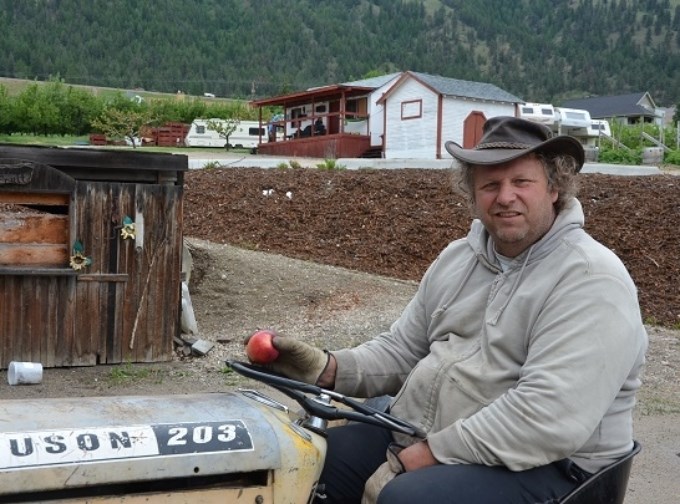
FILE - Orchardist Alan Gatzke holding a spartan apple, taken from a batch fresh out of storage that will be made into pies at his bakery and sold by the slice at his cafe.
Image Credit: FILE PHOTO
April 03, 2020 - 7:00 AM
A Lake Country farmer who put out job ads looking for temporary workers this season has received hundreds of applications, many from laid-off oil patch workers.
From November to January, Alan Gatzke, owner of Gatzke Orchards, sent out ads to get workers to help him for the upcoming fruit picking season. During that time, he received two applications. Now he’s receiving hundreds of applications. He suspects many of the oil workers are residents who have been working in Alberta, but are now home during the pandemic.
“We’ve had resumes like ‘I’m laid off in the oil patch and I’m looking for something to do, is there anything to do on the farm?’” he said. “I’m not sure how many of those people that were earning oil patch money would be willing to pull weeds for $15 an hour, but there’s definitely a shift in that market.”
The Alberta oil economy has collapsed during the COVID-19 pandemic.
READ MORE: Alberta premier says all options on table to fight oil price collapse
Gatzke currently has two local workers and four foreign ones that are in isolation after arriving at the farm, he said. Temporary foreign workers are required to remain in isolation for 14 days after their arrival, according to federal government regulations.
Okanagan Valley farmers and orchardists employ roughly 7,500 workers each year, 4,500 of those are temporary foreign workers and the rest are backpackers or people from Quebec, said Glen Lucas, general manager with the B.C. Fruit Growers’ Association.
“While we might have some oil workers, it’s unlikely to be the number that we need. Those oil workers are probably expecting high wages, and we pay minimum wage, so that’s going to be a challenge to the extent that we’re willing to get able workers to do the hard work for that wage,” he said.
Over the past few weeks, the Okanagan has also experienced frost snaps, which can damage cherry buds. With fewer cherries and less profit, this could mean fewer workers will be needed, Lucas said.
However, he believes there will be a shortage of work regardless unless farmers can get local unemployed workers out to the farms.
While the Okanagan hires foreign workers, mostly from Mexico and the Caribbean, they don’t come all at once. Some of them are needed now for planting and some pruning but the bulk of them aren’t needed until mid-June. That’s when the labour-intensive apple-thinning work is done. That’s followed shortly after by the start of the cherry harvest.
Despite the federal government making an exemption allowing temporary foreign workers into the country, actually getting to the Okanagan with flight cancellations worldwide poses a challenge for these workers.
Once the province gives its approval, it will take a few days to arrange for charter flights as commercial travel is still prohibited. That means organizing growers and logistical problems that could delay any arrivals for a week or two, Lucas said, in a previous interview.
READ MORE: Why Okanagan orchardists may have to rely more on local labour this year
If you're interested in a job, visit the B.C. Tree Fruits Cooperative Careers page, although there aren't many farm labour jobs available there, or try the Canadian Job Bank.
To contact a reporter for this story, email Carli Berry or call 250-864-7494 or email the editor. You can also submit photos, videos or news tips to the newsroom and be entered to win a monthly prize draw.
We welcome your comments and opinions on our stories but play nice. We won't censor or delete comments unless they contain off-topic statements or links, unnecessary vulgarity, false facts, spam or obviously fake profiles. If you have any concerns about what you see in comments, email the editor in the link above.
News from © iNFOnews, 2020